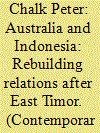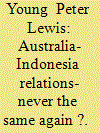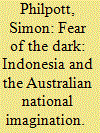| Srl | Item |
| 1 |
ID:
019778


|
|
|
|
|
| Publication |
April 2001.
|
| Description |
133-143
|
|
|
|
|
|
|
|
|
|
|
|
|
|
|
|
| 2 |
ID:
019991


|
|
|
|
|
| Publication |
Aug 2001.
|
| Description |
233-253
|
|
|
|
|
|
|
|
|
|
|
|
|
|
|
|
| 3 |
ID:
019633


|
|
|
|
|
| Publication |
2001.
|
| Description |
1-14
|
|
|
|
|
|
|
|
|
|
|
|
|
|
|
|
| 4 |
ID:
017478


|
|
|
|
|
| Publication |
Sept 2000.
|
| Description |
5-7
|
|
|
|
|
|
|
|
|
|
|
|
|
|
|
|
| 5 |
ID:
007033


|
|
|
|
|
| Publication |
March 2000.
|
| Description |
116-126
|
|
|
|
|
|
|
|
|
|
|
|
|
|
|
|
| 6 |
ID:
020921


|
|
|
|
|
| Publication |
Nov 2001.
|
| Description |
371-388
|
| Summary/Abstract |
In late 1999, former Australian Prime Minister, Paul Keating, attacked the Howard government's handling of the East Timor crisis, arguing that John Howard had neglected the most important priority in the management of Australia's relationship with Indonesia. Citing the enormous population imbalance between the two countries, Keating argued that Howard had failed to 'square away' the potential threat arising from Indonesia's population of more than two hundred million people. Keating's invocation of this reason to be fearful seems distinctly at odds with his confidence and pride in Australia's relationship with Indonesia and his own personal closeness to former President Suharto during his period as Prime Minister. But the use of fear to win a political point in debates about Australia-Asia relations or to discipline Australian voters is far from unusual. Indeed, fear has been perhaps the dominant factor in shaping Australia's relations and policies towards Asia and the perceptions of a sceptical community.
This article argues that fear is an integral and inescapable element of Australia's relations with Indonesia. However, rather than presenting fear as evidence of flawed diplomacy or as being necessarily irrational, I argue that fear is a constitutive element of relations with Indonesia in much the same way that trust has been an enduring feature of Australian relations with the United States. There have been, of course, many critics of unquestioning Australian alignment with United States' foreign policy and, equally, there have been critics of the various manifestations of Australian policy towards Indonesia over the years. It is not my intention to suggest that Australian attitudes to Indonesia have been without contradictions or that they remained unaffected by changes in Australia, Indonesia and the region more generally. Among politicians on both sides of parliament and among journalists and academics there have been many who have sought to improve what has been a troubled relationship.
But despite these efforts, Australian attitudes towards Indonesia are partly constructed in immutable discourses of fear and anxiety. The images and metaphors used to describe Indonesian society and assumptions about 'our' and 'their' national character reflect an enduringly negative view of Indonesia. Moreover, politicians, journalists and academics alike are caught up in this historical web of anxieties and fears. Seemingly routine and benign descriptions of Indonesia's 200 million plus population, its low levels of political and economic development and its status as the world's largest Muslim nation, all play deeply on white Australian fears of Asia even if the authorial intention is to alleviate concerns about Indonesia among Australians.
This article explicitly discusses the politics of fear in modern Western societies and explains how domestic anxiety about the policies of multiculturalism and immigration overlap with other concerns about events and peoples external to the Australian nation. Later, I analyse particular images that have been used to describe Indonesia and argue that not only do they have antecedents in colonial depictions of Indonesia but also tend to imply that Australian values and attitudes are superior. Finally, I argue that the key to establishing better relations with Indonesia is not a clearer understanding of 'them', but an ongoing and thoughtful unpacking of the values and fears that constitute 'us'.
|
|
|
|
|
|
|
|
|
|
|
|
|
|
|
|
| 7 |
ID:
019711


|
|
|
|
|
| Publication |
2001.
|
| Description |
4-10
|
|
|
|
|
|
|
|
|
|
|
|
|
|
|
|
| 8 |
ID:
007079


|
|
|
|
|
| Publication |
2000.
|
| Description |
171-180
|
|
|
|
|
|
|
|
|
|
|
|
|
|
|
|
| 9 |
ID:
019781


|
|
|
|
|
| Publication |
June 2001.
|
| Description |
181-208
|
|
|
|
|
|
|
|
|
|
|
|
|
|
|
|